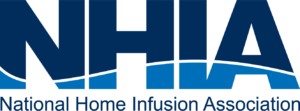Alexandria, VA (March 21, 2023)—The National Home Infusion Association (NHIA) is pleased to announce that it successfully petitioned the Centers for Medicare and Medicaid Services (CMS) to secure a new billing code for injectable immunotherapies and revise an existing code to facilitate administration of a wider range of monoclonal antibodies for Respiratory Syncytial Virus (RSV). The request is part of a broader effort to modernize the Healthcare Common Procedure Coding System (HCPCS code) set used by commercial health plans, including some Medicare Advantage and Medicaid programs, to reimburse for infusion services.
NHIA requested that the agency revise the existing code, S9562, from a drug-specific code to one that was therapy specific, thus allowing it to accommodate a growing number of Food and Drug Administration (FDA)-approved injectable immunotherapies. The agency recently announced its final coding decisions in its Second Biannual HCPCS Coding Cycle, effective April 1, 2023.
First, CMS established a new HCPCS Level II code, S9563, “Home injectable therapy, immunotherapy, including administrative services, professional pharmacy services, care coordination, and all necessary supplies and equipment (drugs and nursing visits coded separately), per diem.”
Second, CMS revised the HCPCS Level II code S9562, “Home injectable therapy, palivizumab, including administrative services, professional pharmacy services, care coordination, and all necessary supplies and equipment (drugs and nursing visits coded separately), per diem” to read “Home injectable therapy, palivizumab or other monoclonal antibody for RSV, including administrative services, professional pharmacy services, care coordination, and all necessary supplies and equipment (drugs and nursing visits coded separately), per diem.”
NHIA was instrumental in creating the home infusion S-codes, which became effective in 2002, to standardize billing practices for home and alternate site infusion when there was only one approved injectable immunotherapy administered in the home. Since then, the number of injected immunotherapies has grown substantially. Without a code to use for newly approved therapies, providers use “not otherwise classified, NOC codes.” Thus, as the volume of FDA approvals for injectable and infused drug therapies has increased, use of NOC codes has increased exponentially, which has several disadvantages for both providers and payors. Modernizing the code set to include new drug therapies will allow providers to contract appropriately for injectable immunotherapies based on their level of complexity.
“NHIA appreciates that CMS is acknowledging the broader range of medications being administered in the home setting by creating this new code,” said NHIA President and CEO Connie Sullivan, BSPharm. “Payors and providers should work to incorporate these changes into their home and alternate site infusion contracts.”
“The association plans to submit additional code requests in the future to ensure that coding and claims practices accurately reflect the services delivered by home and alternate site infusion providers,” said Bill Noyes NHIA’s Senior Vice President of Reimbursement Policy.
NHIA will be discussing these coding additions and efforts to modernize the coding set during the Execute Preconference seminar at The NHIA 2023 Annual Conference on March 26 at the Gaylord National Resort and Convention Center in National Harbor, MD.
Background on Home Infusion S codes
25 years ago, NHIA was instrumental in its work to create a HCPCS S-code set for home infusion claims in order to meet the 2002 HIPAA-compliant Transaction and Code Sets Standard deadline. Commercial health plans wanted a code set to allow for continued coverage of home infusion therapies, above and beyond the very limited coverage that existed at the time in Medicare (which continues today). HCPCS codes that begin with an S are not recognized by Medicare but have become the standard for commercial health plans’ coverage of home infusion therapy.
The S-codes are made up of about 50 therapy-specific S-codes that describe what is included in payment and specify what it coded, billed, and paid for separately. For example, a typical HCPCS description includes, “home therapy; administrative services, professional pharmacy services, care coordination, and all necessary supplies and equipment (drugs and nursing visits coded separately), per diem.” Per diem is coded and paid every day the patient is on service beginning with the day the therapy is initiated and ending with the day the therapy is permanently discontinued.
#####
NHIA is a trade association that represents companies that provide medically necessary infusion therapies to patients in alternate sites, as well as companies that manufacture and supply infusion and specialty pharmacy products. The association’s mission is to provide advocacy, education, and resources to the home and alternate site infusion community so the patients they serve can lead healthy, independent lives. For more information, visit www.nhia.org.
